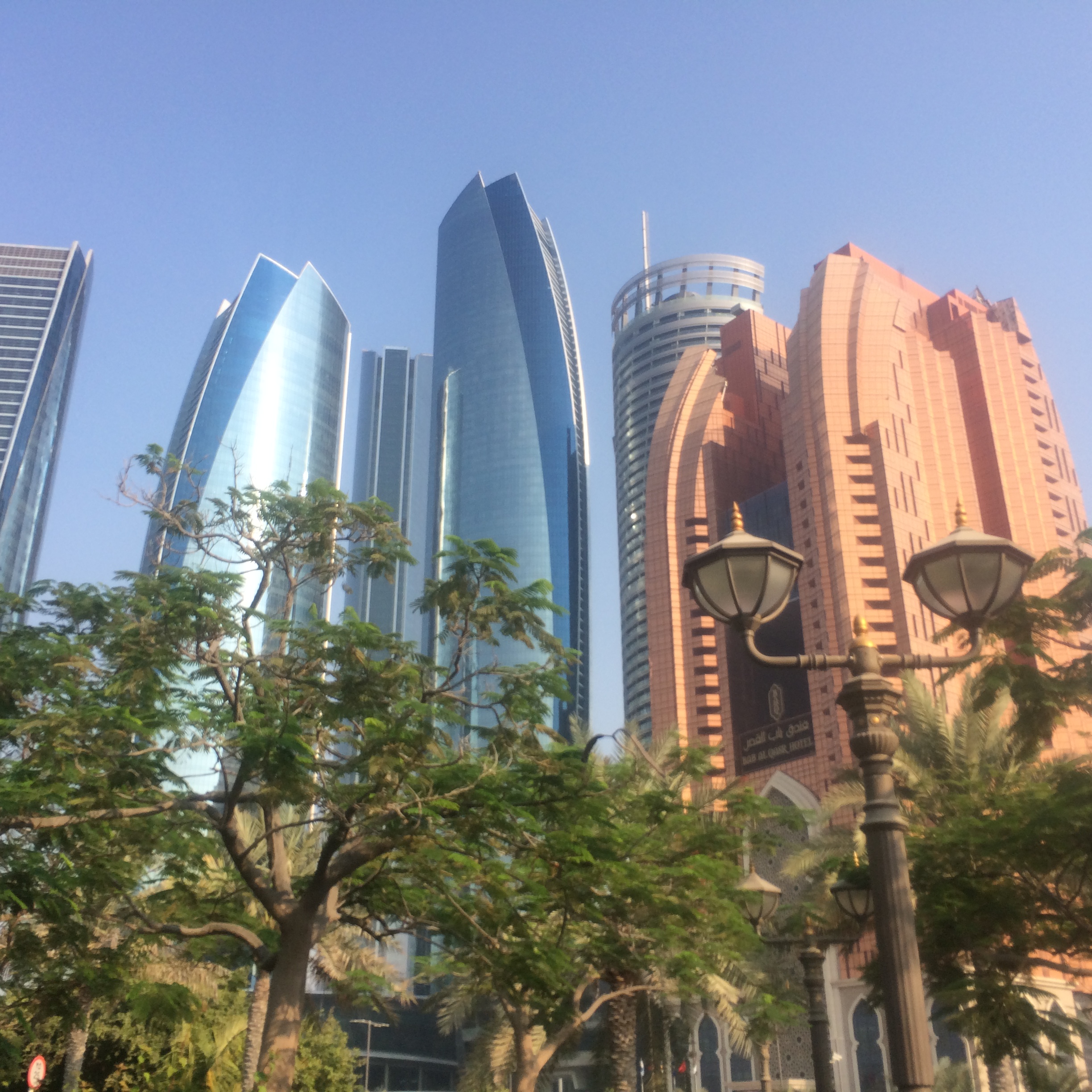Traveling to the Middle East for the First Time?
10 Frequently Asked Questions for the Female Traveler.
These answers are based on my travel, work, and experiences in the Gulf Nations of the United Arab Emirates (UAE) and the State of Qatar. All airline references are to the ME3 – the best airlines in the world – Emirates, Etihad, and Qatar Airlines.
1- Do you feel safe traveling in the Gulf States as a female, especially when you are alone?
Safety and security is of paramount priority for a woman traveling alone. I feel as safe traveling in the Middle East as I do living and working in the Far East. That is, I feel extraordinarily safe and secure.
From the moment I begin check-in at any one of the ME3, I feel my as though I am an honored guest and exquisitely looked after. The staff of the ME3 - Emirates, Etihad, and Qatar Airlines, are some of the most professional and well trained Airline Staff in the industry.
The sense of security continues throughout the arrival and departures. For instance, in Qatar, Hamad International Airport (مطار حمد الدولي) (DOH) offers a “Women’s Only Visa Line.” And, if you are fortunate enough to fly First or Business Class, in addition to DOH, the lounges in Dubai International Airport (مطار دبي الدولي) (DXB) and Abu Dhabi International Airport (مطار أبو ظبي الدولي) (AUH) offer private Women’s Showers and Make-up Lounges.
Abu Dhabi, UAE © Flyga Twiga™ LLC
2- Must I cover my head?
This actually depends on where you are in the Middle East, and which sites you are planning to visit.
Many of the “stories” that make headlines come from, in my opinion, women who are not respectful of their environment. If you are respectful of Middle Eastern Religions and Customs, there is a whole world of traditions and cultures to experience.
If you choose to not adhere to local customs, do not be surprised if you are chastised by other travelers or expatriates (usually shortened to “expats”). Many respectful travelers, and especially expats who are living in the Middle East, feel strongly about keeping their reputation of honoring local cultures.
3- Should I purchase my own Abaya?
I believe this choice should be based on the amount of time you plan on traveling in the Middle East and the places there you wish to visit. Although I had traveled in the Middle East and in some predominately Muslim East and Southern African places for nearly nearly a decade, I didn’t purchase an Abaya until a few years ago.
Factors you may wish to consider:
Do you plan on visiting a lot of Mosques? Do these Mosques require Abayas & Headcoverings? If so, do they rent them, and if so, how long are the waits for rental?
Are you unusually tall or short, and thus would an Abaya made to measure make your touring more pleasurable?
How often will you wear your Abaya?
And while top Fashion Houses, such as Dolce & Gabbana, have exquisite Abaya collections, if you choose to purchase an Abaya, it is best to keep it with minimal “bling.” Abaya styles vary by region. For example, my Abaya was purchased in Nairobi, Kenya. Every time I visit a Mosque in the Middle East, I am either asked where it is from or they guess correctly.
State Grand Mosque (Imam Muhammad ibn Abd al-Wahhab Mosque) Doha, Qatar © Flyga Twiga™ LLC
4- I heard public display of affection is forbidden. Is this true?
Err on the side of discretion. Everyone’s definition of “public display” is different. You could search Social Media all day and get “experts” who give widely varying answers to this question. The bottom line is, married or not, do not touch a person of the opposite sex in public.
And, on a similar line of “forbidden”, don’t forget “hand gestures” and certain words, of the profane nature, can land you into a quite a bit of hot water, to put it mildly. Mindfulness of your locale, self-restraint, and respect in these instances are all that are required for you to have safe travels.
Kempinski Hotel, Ajman, UAE © Flyga Twiga™ LLC
5- My male partner and I are not married. Can we stay in the same hotel room?
No. While there may be a thousand stories of those who “had no trouble at all” why risk a wonderful travel experience? If you are found to violate local laws, and this is true everywhere in the world, even if you are not charged with “a crime”, you may never be allowed entrance into the country again.
And, if for some reason you are newly married and haven’t had time to change your passport name, or you did not take your husband’s name, I always advise in these circumstances that couples travel with an official/certified copy of their “Marriage Certificate.”
This question is truly answered by the old adage that “it is better to be safe, than sorry.”
Sundowner Park Hyatt Abu Dhabi © Flyga Twiga™ LLC
6- Can I drink alcohol?
In most instances, Qatar and the UAE are extremely tolerant of the imbibing of alcohol. That said, you must be aware that “public intoxication” is illegal. And, the purchasing of alcohol, outside of Global Hotel Chains, is strictly regulated.
And, both the UAE and Qatar differentiate alcohols. An example of this is that Champagne, but not hard liquor, is served before flight takeoffs in First and Business Classes in the UAE & Qatar.
If your evening “sundowner” is a “must-keep” tradition, simply be sure to check with your host airlines and hotels prior to travel to the Middle East.
Oryx, Desert Safari, UAE © Flyga Twiga™ LLC
7- I have allergies, are there certain drugs I am not allowed to bring with me?
Every year there are stories about someone traveling through the Middle East who “didn’t know” that a certain medication was prohibited. As a responsible traveler, it is upon your shoulders to know what is or is not allowed. Especially, if you have cold, allergy, or sleep medications you regularly take, whether the medication is by prescription or over-the-counter.
For the UAE, if your medication contains one of the ingredients listed by the the Narcotics and Psychotropic Control Section, Registration and Control Department at the Ministry of Health and Prevention , then it is prohibited in the United Arab Emirates (UAE). Here is a link provided by the United Arab Emirates Ministry of Health & Prevention of current medications on the list.
8- I heard that some Messaging Platforms are banned. What can I do to insure I can communicate with my family when I travel?
This is a burgeoning travel issue throughout the world. As Governments and Corporations strive to find balances in profits and security, the allowed Messaging Platforms can often change suddenly.
Desert Safari UAE © Flyga Twiga™ LLC
9- I am a Western Business Woman and always shake hands. Should I offer to shake a Man’s Hand?
Only shake a Gentleman’s Hand, if he offers to shake your hand first. Do not extend your hand first as a sign of greeting. I find it most easy, especially if I am in my Abaya, to greet a Gentleman with a simple head bow, much as I do when informally greeting someone in the Far East.
Do not be surprised if a Gentleman in the Middle East greets you by placing his hand on his heart/chest and slightly bowing. This has been adopted in some business cultures as a way around the touching of a female to whom you are not related, but to whom you wish to pay respect.
10 - What is Halal Food?
Halal translates from Arabic as “permissible.” There are numerous intricacies in the application of Halal. For the traveler, this offers delicious, locally original food.
The most notable aspect of Halal is the lack of Pork. Dishes such as sausage or bacon, are often served made with chicken or turkey. Unless you are on a highly restrictive diet, Middle Eastern Cooking provides a plethora of culinary experiences, such as tabbouleh, pita bread, hummus, shawarma, labneh, to name just a few!
Sheikh Zayed Grand Mosque (جامع الشيخ زايد الكبير) Abu Dhabi, UAE © Flyga Twiga™ LLC
A Brief Note About Ramadan
As a responsible traveler, the most important aspect of your journeys in the Middle East, as well as parts of East Africa, during Ramadan is observing respect for others’ religion and customs.
During Ramadan, most Muslims observe a fast during the daylight hours. Some airlines and hotels may adjust their policy on serving alcohol. In addition, smoking, eating, or drinking (or chewing gum!) in public is discouraged and could see you fined and reprimanded. This includes the “to go” cup of coffee or tea. So, if it is your tradition to walk around with a drink in your hand, put that on hold until after Ramadan.
And, while showing modesty is always the way to go in the Middle East, this is of particular importance during Ramadan. Remember, you are in their home. Being respectful is what separates those of us on a true journey or Safari, from those merely passing through.
Jumeirah Mosque, Dubai, UAE © Flyga Twiga™ LLC
Content Copyright 2026 Flyga Twiga™ LLC. AI Free. All Rights Reserved.







